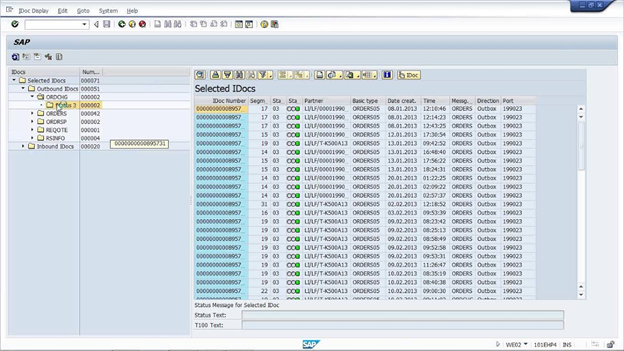Introduction
IDocs (Intermediate Documents) are a fundamental component of SAP systems, designed to facilitate efficient and structured data exchange between SAP modules or with external systems. Acting as standardized data containers, IDocs enable seamless communication across diverse business processes, such as procurement, logistics, and finance. They support asynchronous communication, allowing systems to transfer large volumes of data without interruption. IDocs provide error-handling and monitoring features, ensuring reliable data integration. Refer to the SAP Training in Noida to learn more about SAP IDocs. With their customizable structure and predefined formats, they cater to both standard and unique business requirements. Overall, IDocs play a crucial role in automating processes and maintaining data consistency in SAP ecosystems.
What Are IDocs In SAP Systems?
IDocs (Intermediate Documents) in SAP are standardized data containers used for electronic data interchange (EDI) between SAP systems or with external systems. They facilitate asynchronous communication, making it possible to exchange structured data reliably and efficiently. IDocs are widely used in business scenarios such as sending invoices, purchase orders, or delivery notifications.
Each IDoc consists of three main components:
- Control Record: Contains administrative data such as sender/receiver information and the type of IDoc.
- Data Records: Hold the actual business data in a hierarchical structure.
- Status Records: Reflect the processing status of the IDoc, indicating success or errors.
IDocs function as messages within SAP and can be sent via protocols like ALE (Application Link Enabling) or EDI.
Key features include:
- Flexibility: Support custom structures to meet specific business needs.
- Reliability: Include monitoring tools to track errors.
- Standardization: Use predefined formats like ORDERS (purchase orders) or INVOIC (invoices).
IDocs streamline data integration, reducing manual errors and enhancing operational efficiency, making them a cornerstone for automating processes in complex SAP environments.
Role Of IDocs In SAP Systems
IDocs (Intermediate Documents) play a critical role in enabling seamless data communication between different SAP systems or between SAP and non-SAP systems. Their primary purpose is to facilitate the exchange of structured business data in an automated, standardized, and reliable manner, ensuring smooth integration across diverse platforms and systems.
Key Roles and Functions:
1. Data Integration Across Systems
IDocs enable data transfer between multiple SAP modules (e.g., SAP SD and SAP MM) or between SAP and external systems like CRM or legacy applications. They are crucial for maintaining data consistency across distributed systems in complex enterprise environments. One can join the SAP Online Courses with Certificates for the best opportunities.
2. Support for Asynchronous Communication
Unlike synchronous communication methods (e.g., RFC), IDocs work asynchronously, allowing the sending system to continue processing without waiting for a response. This is particularly useful for time-sensitive and large-scale data transfers.
3. Standardized Data Format
IDocs provide predefined formats for common business processes, such as orders (ORDERS), invoices (INVOIC), or delivery notes (DELVRY). These standardized formats streamline communication with trading partners and ensure compatibility across systems.
4. Error Handling and Monitoring
IDocs offer built-in mechanisms for error tracking and status monitoring. Each IDoc carries a status record that indicates whether the message was successfully processed, pending, or failed, simplifying troubleshooting.
5. Customization for Business Requirements
While IDocs have standard templates, they are highly customizable. Businesses can create custom IDoc types to accommodate unique data exchange requirements without disrupting existing processes.
6. Cost-Effective and Scalable Solution
By automating data exchanges, IDocs eliminate the need for manual intervention, reducing labour costs and minimizing errors. They also scale well for large organizations with high transaction volumes.
Use Cases:
- Procurement: Sending purchase orders from SAP MM to vendors.
- Logistics: Sharing shipment details with third-party logistics systems.
- Finance: Transferring invoice data to external accounting systems.
Thus, IDocs act as a backbone for data communication in SAP ecosystems, enabling streamlined business processes, improved operational efficiency, and enhanced collaboration within and outside an organization. Check the Sap Course Details to learn more.
Conclusion
In summary, IDocs play a vital role in SAP systems by enabling standardized, efficient, and reliable data exchange across SAP modules or with external systems. Their asynchronous communication, error-handling capabilities, and customization options make them indispensable for automating business processes and ensuring data consistency in complex enterprise environments. By reducing manual intervention and supporting scalability, IDocs enhance operational efficiency, minimize errors, and streamline integration across diverse platforms. Whether for procurement, logistics, or financial processes, IDocs serve as a cornerstone for seamless connectivity and effective data communication, making them a critical component of SAP’s robust architecture.


